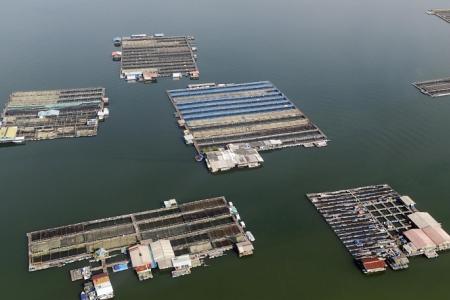1 in 4 of Singapore fish farms shut down in past year
About a quarter of Singapore’s sea-based fish farms have exited the industry over the past year, with some farm operators saying they had accepted a financial support package from the authorities to wind up operations.
Singapore Food Agency (SFA) figures showed that there were 74 sea-based fish farms in October 2024, down from 98 in 2023, according to its 2023 food statistics report. Between 2019 and 2022, the number of sea-based fish farms held steady at about 110.
At least five fish farm operators that The Straits Times spoke to said they were offered a support package from SFA to ease the financial burden of winding up their operations.
Farmers said they had a year – between July 2023 and June 2024 – to take up the package to help them reinstate the sea space their farms occupied.
The Straits Times has asked SFA how many farmers accepted this package, which amounted to up to $100,000.
The support package comes as sea-based fish farms in Singapore are being transitioned to a new sea space management model by the SFA, which the agency announced in 2022.
Farms will have to pay for the use of sea spaces under the new scheme, which took effect in 2024. They did not have to previously.
For fish farm operators, this means that the cost of maintaining a farm is expected to increase, with farms set to pay $3,600 per year to use half a hectare of sea space from 2026, in addition to a $145 annual farm licence fee.
Farmers are currently paying 20 per cent of the $3,600 fee in 2024, and 50 per cent in 2025, to mitigate the impact of the increase.
Those who opted for the support package cited factors such as higher costs and changing environmental conditions that could impact yield. Some also decided to retire.
Mr Joseph Wee, owner of Aquablue, a farm that reared grouper and lobster, told The Straits Times that he had shut down his farm in the East Johor Strait in June 2024, after taking up a $100,000 support package from SFA.
Mr Wee, 63, said about 30 per cent of the entire sum was disbursed before the reinstatement of his farm’s space – which refers to demolishing existing structures there – while the remainder was given after the demolition was completed.
Farmers said they were required to engage marine scanning services to ensure no infrastructural debris had been left on the seabed.
Mr Wee, who had been farming for about 15 years, said he spent around $40,000 on disposing of his farm and the surveys, allowing him to pocket the remaining $60,000 as retirement savings.
He said he decided to retire when the offer came along because of high labour costs and the significant level of investments needed to maintain the farming structures over the years.
“As the farming structures are made from wood, these would slowly deteriorate over the years, after being exposed to the seawater and rain, and need constant repair and maintenance,” said Mr Wee.
He had initially planned to sell his farm and transfer the licence to the buyer, but said SFA did not allow this.
“This leaves us with no choice but to either bite the bullet and continue farming, or shut down our farm and exit the industry,” he added.
SFA had told ST that the Government provided farmers who chose to exit the industry with support to reinstate their farm space, as well as job-matching and training for those who opted for a career switch.
Some farmers said it has been difficult to profitably meet SFA’s annual minimum productivity levels of 17 tonnes per half hectare of sea space they occupy.
SFA said such requirements have been part of the licensing conditions since the 1990s, and are in place due to space constraints.
The agency added that it will support farmers who are keen to increase productivity, by providing account managers to assist and advise them, as well as through funding support for technology adoption.
Get The New Paper on your phone with the free TNP app. Download from the Apple App Store or Google Play Store now


